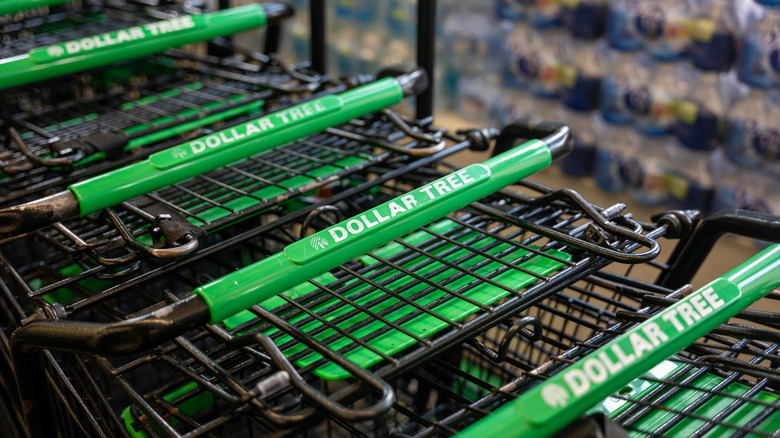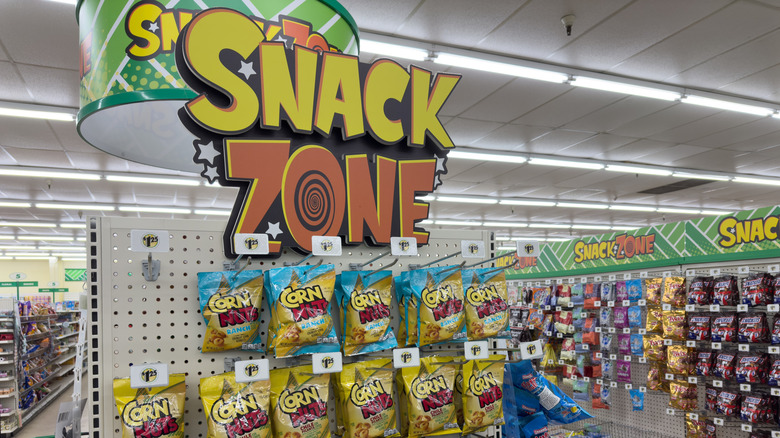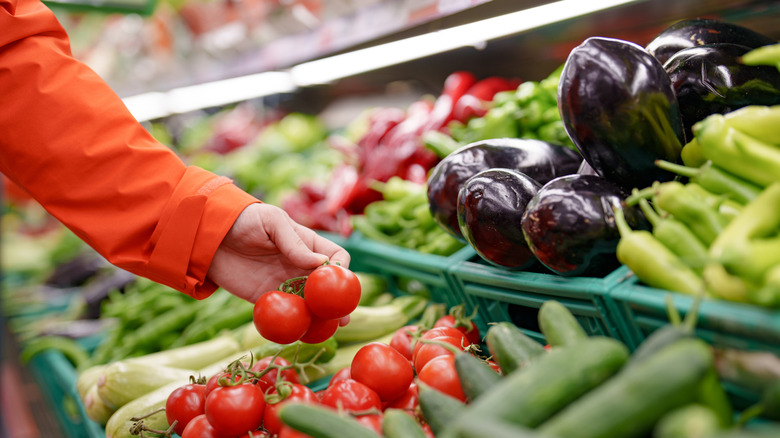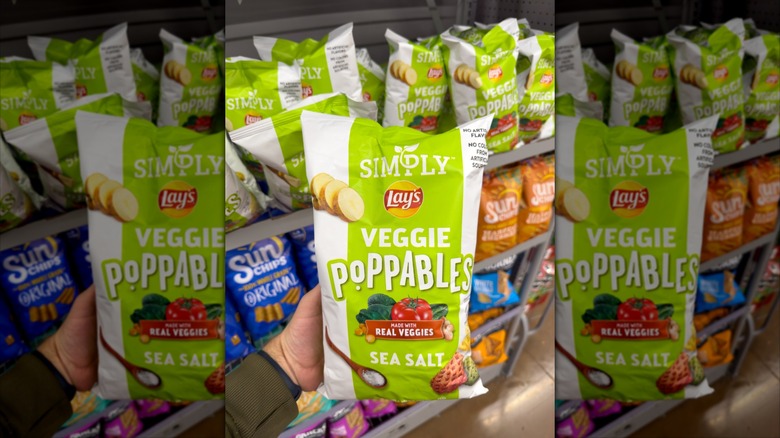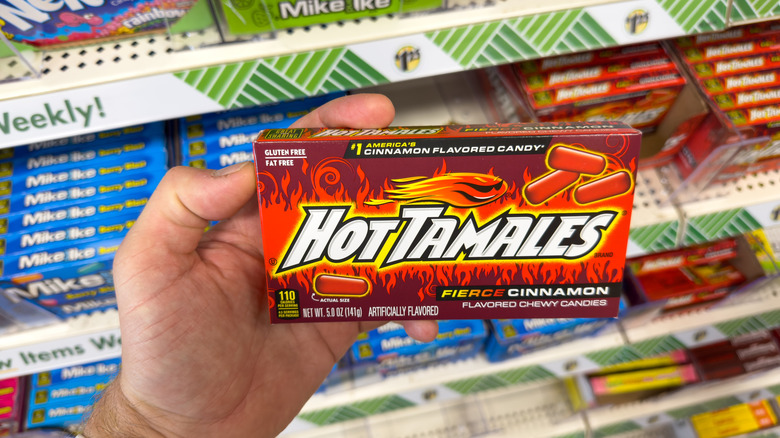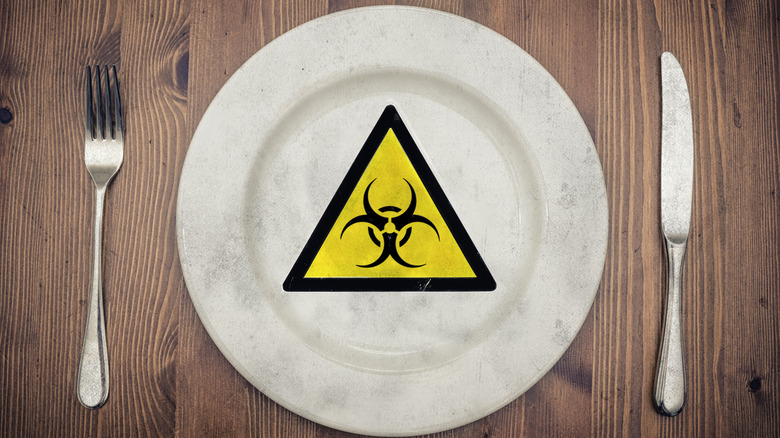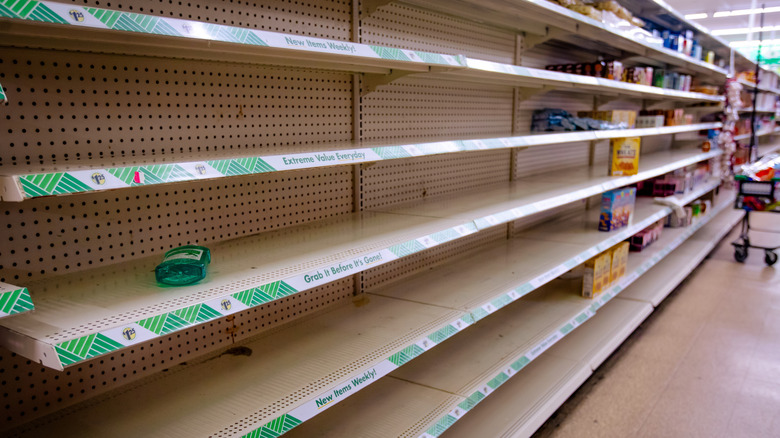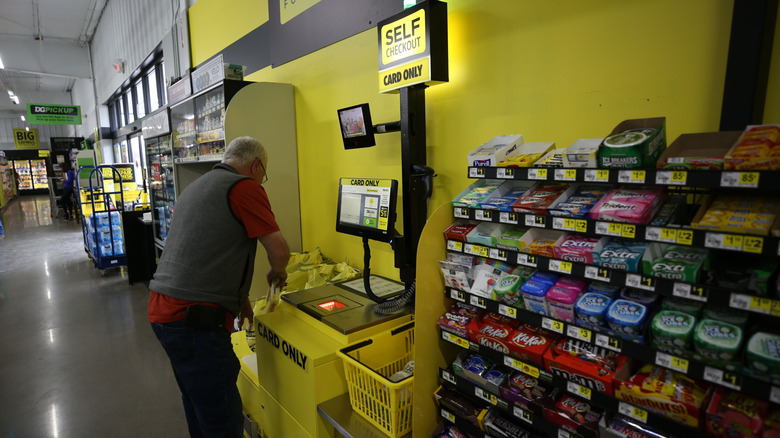12 Reasons To Think Twice Before Buying Food At The Dollar Store
Dollar stores are a popular pit stop for shoppers looking for bargains on food and other household goods, and many families rely on the variety of discount products they can offer. These retailers aren't always the liquidation outlets we once thought. Today, the companies buy much of their inventory from major manufacturers like Coca-Cola and General Mills, but that shouldn't stop you from investigating a few reasons to skip their seemingly cost-saving offerings
Dollar General and Dollar Tree are the largest retailers of their kind in the U.S. These bargain-hunter paradises are expanding like wildfire and are set to open more than 1,300 new locations by September 2024. With more than 35,000 dollar stores nationwide already, it's clear this business model is thriving, especially during this era of elevated inflation. But are these grocery items safe and nutritious, or are there some foods you should avoid altogether? If you're a big-picture kind of consumer, we curated a dozen reasons to think twice before buying food at the dollar store.
1. Dollar stores are notorious for selling heavily processed foods
Dollar stores sell tons of non-perishable, shelf-staple foods. Unfortunately, the bulk of their edible inventory features highly processed options. These calorie-laden, pre-packed items are loaded with ingredients like salt, sugar, and unhealthy fats. Studies show that over-consuming ultra-processed foods comes with risks for serious health conditions, including type 2 diabetes, heart disease, and cancer, and our kids aren't immune, either.
As many as 67 percent of the calories consumed by children and young adults ages 2 to 19 come from ultra-processed foods, and they're affecting our youth. Popular dollar store offerings like ready-to-eat deli meat, sweetened drinks, chips, cereal, and frozen pizza are attractive to kids, and manufacturers know it. The food industry packs ultra-processed foods with artificial colors, flavors, and sweeteners. While these additives do enhance the taste and appearance of products, and extend their shelf lives, they could come with long-term health risks. That should make you think twice about feeding ultra-processed foods to your family.
2. Fresh fruits and vegetables might be scarce or unavailable at dollar stores
Most of us understand that fruits and vegetables are an important part of a balanced diet. Many dietitians recommend eating at least five servings a day, but only a small percentage of dollar stores routinely carry fresh produce. Even stores that offer a fresh food department, such as DG Market, dedicate just 16 feet of wall space for items like apples, onions, and salad kits. While this effort is certainly laudable, you'll still only find a fraction of the fresh offerings a full-service supermarket carries as a matter of course.
Most parents work hard to provide their kids with nutrient-dense meals that fuel their growing bodies. However, some sources say that these corporations aim to prevent the expansion of traditional grocery stores that stock more nutritious, fresh produce. Low-income neighborhoods are often hit the hardest, because these areas are saturated with dollar stores that lack a wide variety of fresh fruits and vegetables.
3. Dollar stores might not have the same quality control measures as traditional grocery stores
Advocacy groups have raised serious concerns about the careless safety practices in dollar stores, and many organizations are campaigning for change. With allegations of sanitation violations, sloppy pest control measures, and low-quality foods, whistleblowers are speaking out about the negative impacts bargain retailers pose to unsuspecting shoppers. Unfortunately, though, some of the major dollar store players are slow to improve on this critical factor.
In a landmark case, Family Dollar Stores, LLC. pleaded guilty to knowingly storing food in a rodent-infested warehouse. Fumigation efforts of the unsanitary storage conditions led to the extermination of over 1,200 rats. That's definitely a think-twice issue. The lawsuit led to a settlement of over $41 million — the largest of its kind in history. Family Dollar and its subsidiary Dollar Tree did voluntarily recall all the affected products sold since 2021, from more than 400 stores across six states. But presiding Judge Kearney wasn't completely satisfied. The U.S. Magistrate also ordered the chain of discount stores to meet strict compliance and reporting requirements until 2027.
4. Dollar store foods could have packaging and labeling Issues
If you've taken a trip through your local dollar store recently, you may have noticed some items have dirty or damaged packaging. Compromised wrappers and containers could seriously affect the product's safety and quality, and much of this damage starts at distribution centers. A dollar store truck driver reported that it's common for trailers fully loaded with food to sit for weeks before making their deliveries to stores. As well, products like cereal, pies, and sugar frequently break open during transit, attracting ants and other pests.
Dollar store food products are subject to FDA labeling requirements, but not everything that makes it on food packages is regulated by the agency. "Manufacturers use colorful images, product names, and claims that give the food a 'health halo,'" said nutritionist Amy Keating at Consumer Reports. That means that claims like "made with real veggies" could mislead buyers, even if they're not technically incorrect. Your local Dollar General may sell Simple Lays Veggie Poppables with a "real veggie" label, but its list of ingredients includes just spinach and tomato powders, and not the wholesome ingredients the PepsiCo brand alludes to.
Labels may not clearly indicate allergens, either. Dollar Tree stores in 17 states sold onion-flavored rings with an undeclared wheat allergen. With 6% of adults and roughly 8% of children suffering from food allergies in America, a lack of disclosure is a deal-breaker for many families.
5. Dollar stores might not effectively follow FDA recall procedures
There have been quite a few serious frozen food recalls in America, and whether the issue revolves around packaging malfunctions, toxic ingredients, or labeling problems, failing to respond to these notices quickly poses a public health threat. Dollar stores are held to the same regulatory requirements for safety as every business that sells food, but some companies have struggled to uphold these laws. The FDA sent a warning letter to Dollar Tree in 2024 for failing to effectively remove fruit purée products from their store shelves weeks after being notified of the product's recall. The agency openly questioned whether the retailer has the capability to quickly act on FDA notices following a series of unsuccessful recall audit checks.
Once a product has been identified for recall, retailers should immediately remove all affected foods from their shelves and storerooms. But many dollar stores struggle with staffing issues that could prevent workers from acting quickly to the threat of foodborne illness. Whether the issue is related to cost-cutting measures or a lack of candidates in underserved areas, just one or two team members may be responsible for multiple duties, leaving little time for personnel to identify and pull recalled products from shelves.
6. The dollar store's low price tag may be deceiving
Dollar stores are well known for selling food at really low prices, but are you truly getting a good deal? While it may look like you're getting a box of dollar store cookies for less than the grocer's price tag, it could really be a case of shrinkflation. It's important to check the label for weight, quantities, and serving sizes, so you know you're comparing apples to apples. Brand-name manufacturers purposefully make many items on the shelves in smaller sizes just for dollar stores, and you may be able to get a better deal at your neighborhood grocery stores with coupons, in-store sales, and loyalty programs. Many supermarkets also offer a terrific selection of private-label food products, which may significantly undercut some dollar store prices.
Those candy aisles sure are inviting at the dollar store, but this is another area of the shop that could dupe snackers with packaging sizes. Shortchanged sweets aren't the only reason why you should think twice about grocery shopping there. Family Dollar paid out an $800,000 settlement in a class action lawsuit earlier this year, after plaintiffs argued that the retailer overstated the number of servings on its in-store and Chestnut Hill brand of ground coffee. Evidently, even checking labels may not be enough to ensure you're getting what you paid for.
7. The local dollar store may be failing our community
Another think-twice issue with this budget-friendly shopping craze is that dollar stores may not be serving the best interests of our communities. Some chains use predatory tactics to kill off local grocery stores and other nearby businesses, by monopolizing sales. This marketplace takeover creates economic distress by reducing jobs and keeping small businesses from thriving. These companies and their hefty market muscle deliver more than just healthy competition. Dollar stores have the resources to undercut neighborhood grocers with thin profit margins. Dave's Market, a small, 13-location grocer in Ohio, cited dollar stores as the reason for its demise. What's left are food deserts that impact residents in ways we couldn't have predicted.
Dollar Tree projected sales in excess of $30 billion for 2024, with only a modest percentage of the corporate giant's profits staying in the area where it was garnered. All the while, the hallmarks of typical dollar stores, like overflowing dumpsters, buildings in disrepair, and overturned shopping carts, give communities a run-down feel. Cities started recognizing the issue in 2018 and began movements to stop the unadulterated spread of dollar stores across the nation. Cities in states like Oklahoma, Georgia, and Texas have passed local zoning regulations and ordinances that limit parking lot sizes or even ban new stores altogether.
8. Some dollar store canned goods contain toxic chemicals
While some canned food items sold at popular dollar stores put other stores' deals to shame, you may want to think twice before bringing that can of peas to the checkout line. Some canned goods found at these discount stores contain toxic interior coatings. In fact, more than half of the products screened in 2021 contained at least one concerning chemical, such as BPA and PVC. National Coordinator of the Campaign for Healthier Solutions, José Bravo, explained, "With their high profit margins, dollar stores must do more to ensure that all of these products are safe" (via Ecology Center). And that's not all. The FDA recommended a voluntary recall from Dollar Tree and Family Dollar in 2024 for lead-containing cinnamon products and fruit purée pouches, as unsafe levels of lead are especially dangerous for children under six, even in small amounts.
Dollar Tree did update its priority chemical policy in 2021, just before the community-led initiative finished testing its products. Corporate bigwigs committed to eliminating the use of phthalates and forever chemicals like PFAS in the company's private-brand food and beverage product packaging. That's definitely a win for people who like stocking up on canned meats and other shelf-staple products, but where are the promises from the rest of the brands to clean up toxins similarly? Cans filled with toxic ingredients should definitely make you think twice before buying food at the dollar store.
9. Your dollar store food may actually be expired
Numerous quality and safety concerns that revolve around dollar stores' expired or soon-to-expire products have surfaced over the years. While there are quite a few myths about expiration dates, there are some cases of dollar store foods being sold long past their best-use-by timeframe. One Ohio mom bought her child a pack of trail mix that had been expired for six months. Another Ohio resident discovered his dollar store pizza was two years old. He purchased the questionable frozen Celeste single-serve cheese pizza in 2019, and the best used by date was 2017. Yikes.
Even baby food might not be safe at the dollar store, and Chicago's City Council has had enough. Officials found more than 3,300 city health code infractions, including some for expired infant formula. These violations led to fines of more than $600,000 over the last eight years. A traditional grocer is probably a better place to stock up on your little one's food. Turnover on fresh foods is also better at grocery stores, while goods like dairy products may not get replaced as often at discount stores. Either way, make sure to check the expiration date on every perishable item before heading to the dollar store's register.
10. Food purchased at the Dollar store may taste different
Some consumers say that the food they purchase from dollar stores doesn't always taste right. For example, one Facebook user posted their concerns and mentioned that "almost every jug of milk bought at [Dollar General] tastes weird," with another commenter saying that it smells and tastes like crayons. Others say that, aside from the strange taste, Dollar General's private label, Clover Valley, produces milk that spoils quickly.
The poor reviews don't stop there. Another dissatisfied customer mentioned their Celeste Breadsticks Cheesy Garlic had a slight chemical flavor, and reviews of the Dollar Tree Boneless Ribeye Steak weren't any better. In an age when eating steak is a luxury for many, finding a ribeye at the dollar store may feel like uncovering a gold nugget in your backyard. Unfortunately, this cut of beef is mechanically tenderized — a process that poses a bacteria-related health risk — but does it taste good? Apparently not. With its strange metallic taste, some buyers reported this as one of the worst cuts of meat they've ever eaten. That kind of feedback is enough to make anyone think twice.
11. Dollar stores may not always stock the products you love
Dollar stores often have a limited selection of food items on their shelves, with healthy choices being especially limited. Some of these items show up in batches, meaning that you can't always do all of your shopping at the dollar store, particularly if you are looking for products like lean meats or organics. Some 99 Cents Only Stores got the memo and have started regularly offering organic products. Going organic comes with a few benefits, and if your family has asthma or bronchitis, avoiding pesticides is probably a good thing.
Although most Dollar Generals offer 100% all-beef hamburgers, fish sticks, and ground turkey in the freezer section, you never know when these things are going to be in stock. Less-processed meats, like raw, frozen chicken, may also be difficult to find or sold out at dollar stores that do occasionally carry them. Low wages and labor shortages may be the reason behind items being restocked less often, and those empty dollar store shelves erode customer loyalty faster than soda pop weakens tooth enamel. So think twice if you're hoping for a consistent supply of your favorite items, because these companies typically make stocking decisions based on the best deals for them, not necessarily what consumers are shopping for on a weekly basis.
12. Dollar stores often lack transparency
Dollar stores might not provide clear information about allergens or their company's handling procedures, while obscuring where the products were made. Dollar stores get food items from a variety of sources, including directly from manufacturers and through closeout deals. These retailers may also employ deceptive tactics to get as much money out of your wallet as possible while selling cheap goods, including leftover seasonal items. If you've ever wondered why the dollar store is selling those pumpkin-flavored creamers in January, this is the reason.
The stores also purposefully shove a lot of products into a small space, to encourage you to toss more into your cart than you may have planned. Their checkout aisles pull the same trick, set up with a focus on impulse purchases. These enticing items may not be the most nutritious snacks, such as store-brand chocolate bars, ultra-processed soft drinks, and fruit juices. Remember to keep an eye on your receipts too, as several dollar stores have been fined for scanner errors, like one Family Dollar in Charlotte, North Carolina, where 20% of the items scanned at the wrong price, overcharging shoppers.
